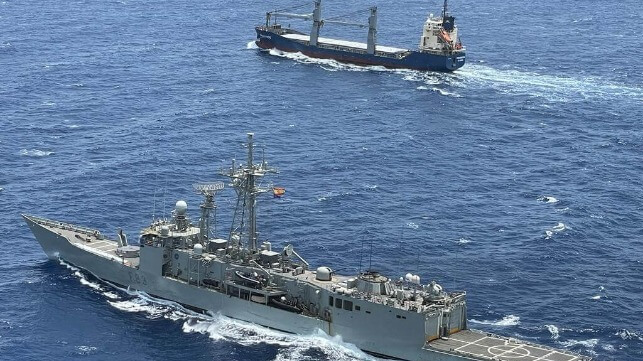US and UK Safety Warnings for Shipping in Gulf of Aden and Indian Ocean

American and British officials issued warnings to ships operating in regions ranging from the Indian Ocean to the Gulf of Aden in response to the recent series of incidents and reports of increased activity in the region. Already known as an area of increased risk for merchant shipping, several lines have acknowledged recent changes in their operations due to the increased activity as well as the threats due to the Israeli war against Hamas.
“Exercise caution when transiting these areas and remain cognizant of evolving threats in this region,” the U.S. Maritime Administration wrote in an alert issued on November 27. MARAD referenced the boarding of the Liberian-flagged tanker Central Park by “unknown armed entities and subsequently release,” as well as the reported attack by an unmanned aerial vehicle (UAV) on the Maltese-flagged CMA CGM Symi. For U.S. commercial vessels operating in these areas, MARAD recommended reviewing advisories for amplifying information and points of contact.
The United Kingdom Maritime Trade Operations (UKMTO) followed up the U.S.’s warning with its advisory this morning, November 29, highlighting three incidents reported close to Aden, a port city located in the southern part of the Arabian Peninsula in Yemen. UKMTO is a Royal Navy capability that acts as an information conduit between the military and the wider international maritime trade.
“UKMTO has received multiple reports from masters of small craft acting suspiciously in the vicinity of the Gulf of Aden. Masters are encouraged to report any irregular activity to UKMTO,” they wrote in the advisory. They are also warning vessels in the area to “exercise caution.”
These warnings came as fears have been growing not only about further actions by the Houthi rebels in Yemen but also of a possible resurgence of piracy coming from the coast of Somalia. At the end of last week, media in Somalia was highlighting a new possible threat after a fishing vessel was reported to have been taken by pirates possibly as part of a dispute over illegal fishing. The reports said that the pirates were threatening to use the seized vessel as a mother ship to stage other attacks unless a ransom was paid.
EU NAVFOR ATALANTA, a joint effort for maritime security which monitors activity in the waters off Somalia however reported that it was tracking the movements of the fishing dhow and it was believed to be moving back toward Somalia. They said in a statement dated November 28 that they had been closely monitoring the vessel’s movements and reporting its position to maritime traffic. They said they have undertaken an extensive tracking effort and seemed to downplay the potential threat from this vessel.
Nonetheless, Maersk on Monday reported that it had decided to temporarily divert two vessels, “due to unforeseen and unavoidable circumstances.” The vessels are the Liberian-registered Lisa (49,999 dwt) which Maersk reported was coming from India and would be diverted to Salalah, Oman, where it is now discharging all cargo. The Maersk Pangani (63,696 dwt) also registered in Liberia was coming from Cape Town and was sent to Mundra, India where she is exchanging cargo with another vessel. She will be returning to West Africa. Both vessels are reported to be owned by Israeli shipping company XT Shipping.
“This decision has been made with careful consideration of various factors, prioritizing the safety of crew, the vessel, and your cargo. While we strive for seamless operations, these circumstances have necessitated this deviation from our usual route,” Maersk writes in its customer advisory.
This follows reports last week by UK security consultants Ambrey that two ships, Glovis Star and Hermes Leader, both managed by the Israeli-controlled Ray Car Carriers diverted immediately after the Houthi attack on the Galaxy Leader. Zim followed suit on November 27 issuing a customer advisory saying that due to the threat to safe transit of global trade in the Arabian and Red Seas, ZIM is taking temporary proactive measures to ensure the safety of its crews, vessels, and customers’ cargo, including diversions. They warned that longer transit times are anticipated while saying they would continue service to the Eastern Med and Israeli ports.
No comments:
Post a Comment